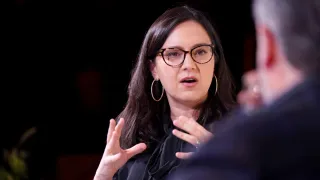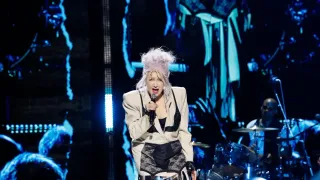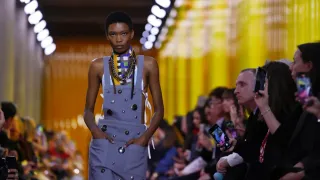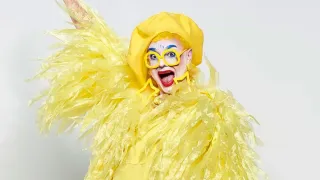November 7, 2017
'Tartuffe' :: Matthew J. Harris on Molière's Play About Scammers and the Saps Who Love Them
Kilian Melloy READ TIME: 9 MIN.
If you happened to see Huntington Theatre Company's production of Suzan-Lori Parks' play "Topdog/Underdog" last year, you might recall the pair of outstanding performances that set the play apart. Both actors in the two-hander, Tyrone Mitchell Henderson and Matthew J. Harris, were nominated for Elliot Norton Awards for their work in the Billy Porter-directed production. Harris took the award, while Porter also won for Outstanding Director in the Large Theater category.
Harris' physically comedic performance was part and parcel of Porter's choreographic direction. The previous year, Harris also impressed Boston audiences with a role in Kirsten Greenidge's play "Milk Like Sugar," another production at the Huntington Theatre Company, which M. Bevan O'Gara directed.
Now the New York-based actor is set to return to Boston once more, appearing again on the Huntington stage as Cl�ante in "Tartuffe," Moli�re's classic play about fake piety and willful blindness. The title character is a huckster whose rhetoric oozes righteousness, but whose conduct is that of the typical con man. The family that takes him in is almost completely bamboozled -- all except for a couple of characters, one of whom is Cl�ante, the brother of the head of the household and a man who sees through Tartuffe's deceptions. (Yes, yes, I know... don't worry, we will get to the current political situation and the play's timeliness in due course.)
EDGE recently had the pleasure of a chat with Matthew J. Harris.
EDGE: First of all, let me note that your appearance last season in the Suzan-Lori Parks play "Topdog/Underdog" garnered you the Elliot Norton Best Actor award. Congratulations on that win!
Matthew J. Harris: That was wonderful. My mom was really happy.
EDGE: I'll bet you were happy right along with her.
Matthew J. Harris: I was -- hey, my happiness was astounding, but pales in comparison to my mom. I was also happy because any time I'm entered in some kind of competition, it's, like, nerves because she's gonna be pissed if I don't win.
EDGE: Your costar, Tyrone Mitchell Henderson, was also nominated for the same award. Did you have mixed feelings about winning?
Matthew J. Harris: There were mixed feelings. Actually, none of us thought I was going to win. We thought he was going to win... except for my mom. But we were both happy to have been nominated. If only one of us had been nominated, that would have felt worse.
EDGE: That play was directed by Billy Porter, and it's no surprise that the staging was done in a way that was very dance-like. You are a dancer yourself, and instruct dance. Could you talk about that? What about dance as an art form draws you?
Matthew J. Harris: [Dance] was something I was actually kind of trying to run away from when I was in college. I was a very serious acting student and I thought that dance, in particular hip hop dance, was getting in my way. I wanted to focus only on acting.
But it just kept following me around -- it was something I had done as a kid. I was a closet boy band fan of InSync and Back Street Boys, and I was a fan of Michael Jackson, and I was trying to learn all the dances. So I started taking dance classes in the city, and I was in a dance company in my high school. I tried to let it go when I was in college, but people kept asking me to choreograph little projects that they had.
Then I realized it was something that I couldn't really live without, and I started teaching... I don't remember how I started. I think I started advertising myself as a private dance teacher, or teaching my own private little group classes. In theater, people would just see it on my r�sum� when I was auditioning for things, and they just wanted to take advantage of it. I choreographed show dances, the first couple of gigs that I got done doing, and that encouraged me to keep using that as my own artistic outlet and to find different venues that I could perform and create my own pieces.
I'm now trying to work on a series of Shakespeare-inspired hip hop dance pieces, and that's been a big objective of mine for a while. I have two pieces; one of them is about Falstaff. It's called 'Brief Candle,' and it deals with the subject of aging. I do it in a fat suit, and I do it in the character of Falstaff, but I don't hinder my movement at all. I'm exploring how there's a lot of things expected of us as we age, and how different things are supposed to make you happy as you get older -- you get married, [etcetera], and these are supposed to be the best moments of your life, but what if you really were the happiest when you were acting a fool with your friends when you were 19 years old? Falstaff, he just wants to hang around with the boys all the time, and it's not cool because he's old. People just say, 'You're profane, and need to get your life together.' But if he was 19 they would just say, 'Oh, that's what 19 year olds do.' I don't even remember what your question was any more, but that's kind of how theater and dance have been working in and out of my life.
EDGE: That was my question, so that's great. I'd like to touch on the fact that even aside from appearing in "Topdog/Underdog" at the Huntington, you have also appeared on Boston stages in Kirsten Greenidge's play "Milk Like Sugar," which M. Bevan O'Gara directed. What was that experience like?
Matthew J. Harris: That was one of the most fun plays I've ever done. I had maybe the smallest part -- I was in, like, four scenes, but it was my favorite role in the play. Bevan was so great about just letting us find everything and treating everything very carefully, and at the same time making it a very bold production. We had a lot of hip hop music I had never even heard of before. It felt very fresh, and the cast -- we all got along so well. I was nervous that I wasn't going to put enough work into my role because we would just go home every night and kick it! We had such a fun time together.
EDGE: Now you are back at Huntington to play Cl�ante in Moliere's "Tartuffe." That's a change of pace! What's it like to be working in a classic French play from the 17th century, as opposed to a contemporary American play?
Matthew J. Harris: You know, my main passion is Shakespeare. I just haven't been lucky enough to do for about four years now. I got to do "In the Heights" in Philly, and then after that everyone just kind of made their mind up about me. The classics just went out the window.
[Laughter]
So this just -- honestly, I am really thankful to have this opportunity. I really love rhetoric, I really love language, I really love the morals that come along with classics -- how important the way that things are supposed to be are to everyone. And some of them are fundamental, it feels like, especially in Shakespeare's plays. Some of these morals that don't feel like they are conservative or liberal, but they're just like, 'Be kind to people. Have integrity. Have honor.' Particularly in this play, we're talking about hypocrisy, mostly, and those are universal things. We don't save anybody from being viewed as flawed in the play, and I think with the classics you explore the universal ideas that nobody is free from. I think that's why I was inspired to make the hip hop dances with Shakespeare [themes], because that's what inspires me -- these kind of existential things that make us move through life. Contemporary plays, they are usually about events; families; a specific thing in time. Growing up as a biracial kid, mixed race, I never really felt part of any particular group, so the things that trigger me are more the bigger existential ideas.
EDGE: You just touched on the plot of "Tartuffe," which is about a how a family takes in someone who looks very pious and moral, but he's a con man. They're willfully blind to the evidence of his true nature. It seems to me that the inclusion of this play in the Huntington's season might be little... pointed, shall we say?
Matthew J. Harris: Yeah, you would think so!
[Laughter]
When I re-read the play after being offered the role, I definitely saw all those parallels. But I think the thing that we're trying to make clear in this is, like I said before, nobody's free of judgment. It's very easy to look at Tartuffe and say, "I recognize that guy! He's just trying to fool everybody to get his way." But he's not the only ridiculous character in the play. He's not the only one who does ridiculous things. Hopefully, we are not just showing a representation of one person, but putting up a mirror on how we can all be ridiculous, and that creates a little more empathy as a society as a whole, so that we can try to listen to each other a little bit more, and maybe have a little bit more, even for just two hours, of a sense of humor about what the hell is going on.
[Laughter]
EDGE: It never hurts to be able to laugh at yourself, right?
Matthew J. Harris: You know, the thing -- "Oh my god, I recognize that, I'm going to laugh about it until ten o'clock and then I'll go back to being depressed about it."
EDGE: How did you come to be in this production? Did they say, "We remember him from before and he'd be great for this!" Or did you hear about a casting notice and decide to throw your name into the hat?
Matthew J. Harris: They did remember me from before, and they were going to cast someone older in the role. My role is often done older, much older. Peter Dubois wanted to cast older, and then after [the casting director] pitched me to him, he just got more and more exited about the idea of having this younger person and re-imagining what the character would be like. So my phone range, and I said, "Yes, indeed!"
EDGE: Tell me a little about how you view Cl�ante, in general and also as a younger version of what's usually done for the role.
Matthew J. Harris: We've talked about quite a few things. This play was written very shortly after the idea of the commedia archetypes, classical archetypes, heavily dominated the stage. This archetype is the one who just goes on and on and on -- the studious one... We also thought he could be well-studied, but not too professorial, because we want to keep it fresh, so we thought of somebody who loves to hear himself talk but who does have a point and who is usually right. He is pretty much right throughout the entire play, and trying to get everybody to see sense. We see him as a Millennial who is kind of a leader of a cause. He's just passionate about what he's saying, he's trying to get the world to see sense, saying, "Oh my god will you guys just wake up? Please!" And we've also discovered that he's probably gay, from some of the hints in the text.
EDGE: Is director Peter Dubois -- as well as the cast and yourself -- bringing other contemporary touches and flourishes into the production? Does it feel like a 21st century take?
Matthew J. Harris: Absolutely. This is a super-wealthy family, and nobody's in classical attire; if there's something that sounds too classical in the text, then we try to figure out how that could pertain to today, The translation also lends itself more to modern times, but it is rhyming couplets -- but that just kind of allows a contemporary audience not to take everything so seriously.
"Tartuffe" plays at the Huntington Avenue Theatre Nov. 10 - Dec. 10 For tickets and more information, please go to http://www.huntingtontheatre.org/season/2017-2018/tartuffe






